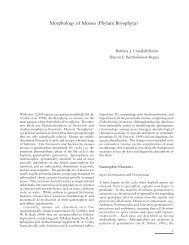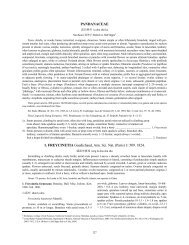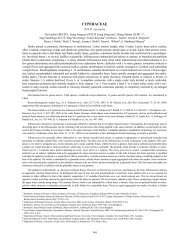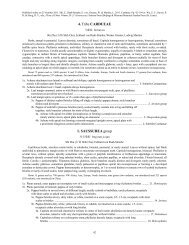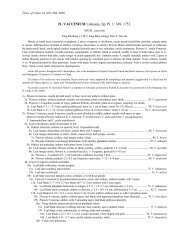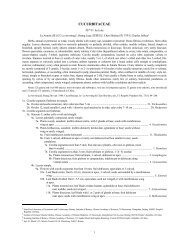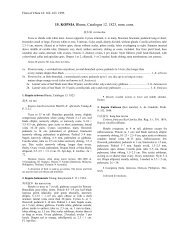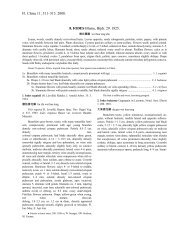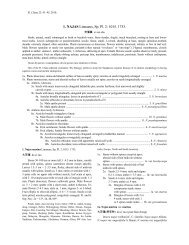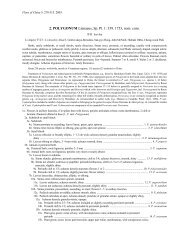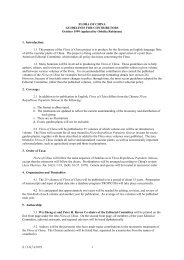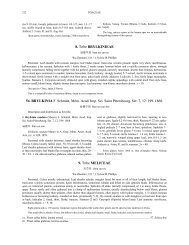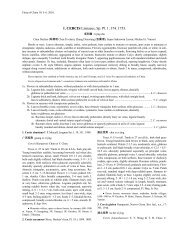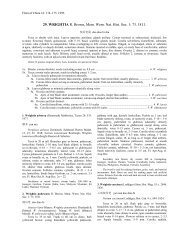You also want an ePaper? Increase the reach of your titles
YUMPU automatically turns print PDFs into web optimized ePapers that Google loves.
EPIDENDROIDEAE<br />
146. SARCOPHYTON Garay, Bot. Mus. Leafl. 23: 201. 1972.<br />
肉兰属 rou lan shu<br />
Chen Xinqi (陈心启 Chen Sing-chi); Jeffrey J. Wood<br />
Herbs, epiphytic, monopodial. Stems erect, elongate, stout, with many leaves. Leaves distichous, sessile, with sheathing bases;<br />
leaf blade flat, thickly leathery to fleshy, jointed to sheath. Inflorescence racemose or paniculate, lateral, axillary, laxly many<br />
flowered. Flowers small to medium-sized. Sepals similar, free. Petals smaller; lip adnate at base to column, 3-lobed; lateral lobes<br />
erect; mid-lobe recurved, adaxially usually conspicuously wrinkled, base with 2 calli at entrance of spur; spur cylindric. Column<br />
small, foot absent; stigma large and round; rostellum short, bilobed; pollinia 4, separate from each other, waxy, subglobose, almost<br />
equal in size, with a linear stipe and a small viscidium.<br />
Three species: discontinuously distributed in China, Myanmar, and the Philippines; one species (endemic) in China.<br />
1. Sarcophyton taiwanianum (Hayata) Garay, Bot. Mus.<br />
Leafl. 23: 202. 1972.<br />
肉兰 rou lan<br />
Sarcanthus taiwanianus Hayata, J. Coll. Sci. Imp. Univ.<br />
Tokyo 30(1): 337. 1911; Acampe hayatae Szlachetko; Cleisostoma<br />
taiwanianum (Hayata) Hayata; Saccolabium taiwanianum<br />
(Hayata) Tang & F. T. Wang.<br />
Stem <strong>25</strong>–100 cm. Leaves many, distichous; leaf blade<br />
lorate, 20–35 × 3–4.5 cm, leathery, ± unequally obtusely bilobed;<br />
basal sheaths long, amplexicaul. Inflorescences often sev-<br />
Camarotis Lindley.<br />
445<br />
eral, ascending, racemose, shorter than leaves, many flowered;<br />
rachis rather fleshy; floral bracts subtriangular, 4–5 mm. Flowers<br />
slightly fragrant, yellowish green, adaxially with purplish<br />
brown transverse stripes or spots, slightly fleshy; pedicel and<br />
ovary 1–1.5 cm. Sepals obovate-oblong to obovate, ca. 10 × 5<br />
mm, obtuse; lateral sepals slightly oblique. Petals ± falcateelliptic,<br />
ca. as long as sepals but narrower, obtuse-rounded; lip<br />
with a short spur at base, slightly 3-lobed; lateral lobes erect;<br />
mid-lobe recurved, nearly suborbicular; disk with 2 calli at<br />
entrance of spur. Column short. Fl. Apr.<br />
● Epiphytic on tree trunks in forests or on cliffs along valleys;<br />
200–800 m. S Taiwan.<br />
147. MICROPERA Lindley, Edwards’s Bot. Reg. 18: ad t. 1522. 1832.<br />
小囊兰属 xiao nang lan shu<br />
Chen Xinqi (陈心启 Chen Sing-chi); Jeffrey J. Wood<br />
Herbs, clambering, monopodial. Stems long, with many long roots and leaves. Leaves many, flat, fleshy, oblong to linear,<br />
with sheathing base, jointed. Inflorescence often borne opposite leaves, rather long, racemose, many flowered. Flowers small or<br />
medium-sized, not resupinate. Sepals and petals free, similar; lip conspicuously spurred or saccate, 3-lobed; lateral lobes broad,<br />
erect; mid-lobe smaller, fleshy; spur often ornamented at its entrance, commonly with a longitudinal septum inside. Column short,<br />
lacking a foot; rostellum projection prominent, beaked; pollinia 4, in 2 subequal pairs on a common long stipe; viscidium very small.<br />
About 15 species: ranging from the Himalayas to SE Asia, New Guinea, Australia, and the Solomon Islands; one species in China.<br />
1. Micropera poilanei (Guillaumin) Garay, Bot. Mus. Leafl.<br />
23: 186. 1972.<br />
小囊兰 xiao nang lan<br />
Sarcanthus poilanei Guillaumin, Bull. Soc. Bot. France<br />
77: 330. 1930; Camarotis poilanei (Guillaumin) Seidenfaden<br />
& Smitinand.<br />
Stems to 1 m, climbing, with internodes ca. 2.5 cm, many<br />
leaved. Leaf blade linear, 15–20 × 1.5–1.8 cm, leathery, apex<br />
obtuse. Inflorescence racemose, with 20–<strong>25</strong> flowers; rachis to<br />
24 cm; floral bracts tiny, ca. 1 × 1 mm. Flowers white to greenwhite;<br />
pedicel and ovary ca. 6 mm. Dorsal sepal linear, 7–8 ×<br />
ca. 1.5 mm, distinctly 3-veined; lateral sepals linear, ca. 6 × 1.5<br />
mm, joined together and adnate to claw of lip. Petals linear, 7–8<br />
× 1.2–1.5 mm; lip spurred, with a basal claw 3–4 mm; spur<br />
conic-cylindric, 2–3 mm. Column slender, ca. 6 mm; rostellum<br />
beak ca. 2 mm; stipe ca. 2 mm. Fl. Mar.<br />
Epiphytic on trees or lithophytic on rocks in mixed forests; 200–<br />
500 m. Hainan [Vietnam].<br />
148. DORITIS Lindley, Gen. Sp. Orchid. Pl. 178. 1833.<br />
五唇兰属 wu chun lan shu<br />
Chen Xinqi (陈心启 Chen Sing-chi); Jeffrey J. Wood<br />
Herbs, terrestrial or lithophytic, monopodial. Stems erect, short, rooting at base. Leaves several, subbasal, distichous, flat, fleshy,<br />
base articulate and sheathing. Inflorescence arising laterally from base of stem, erect, racemose, laxly several to many flowered.



